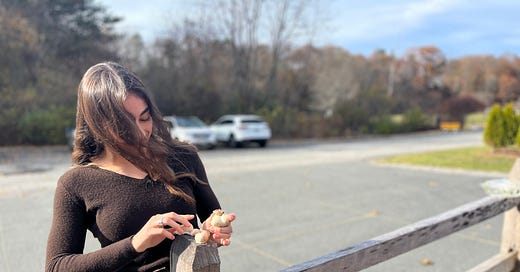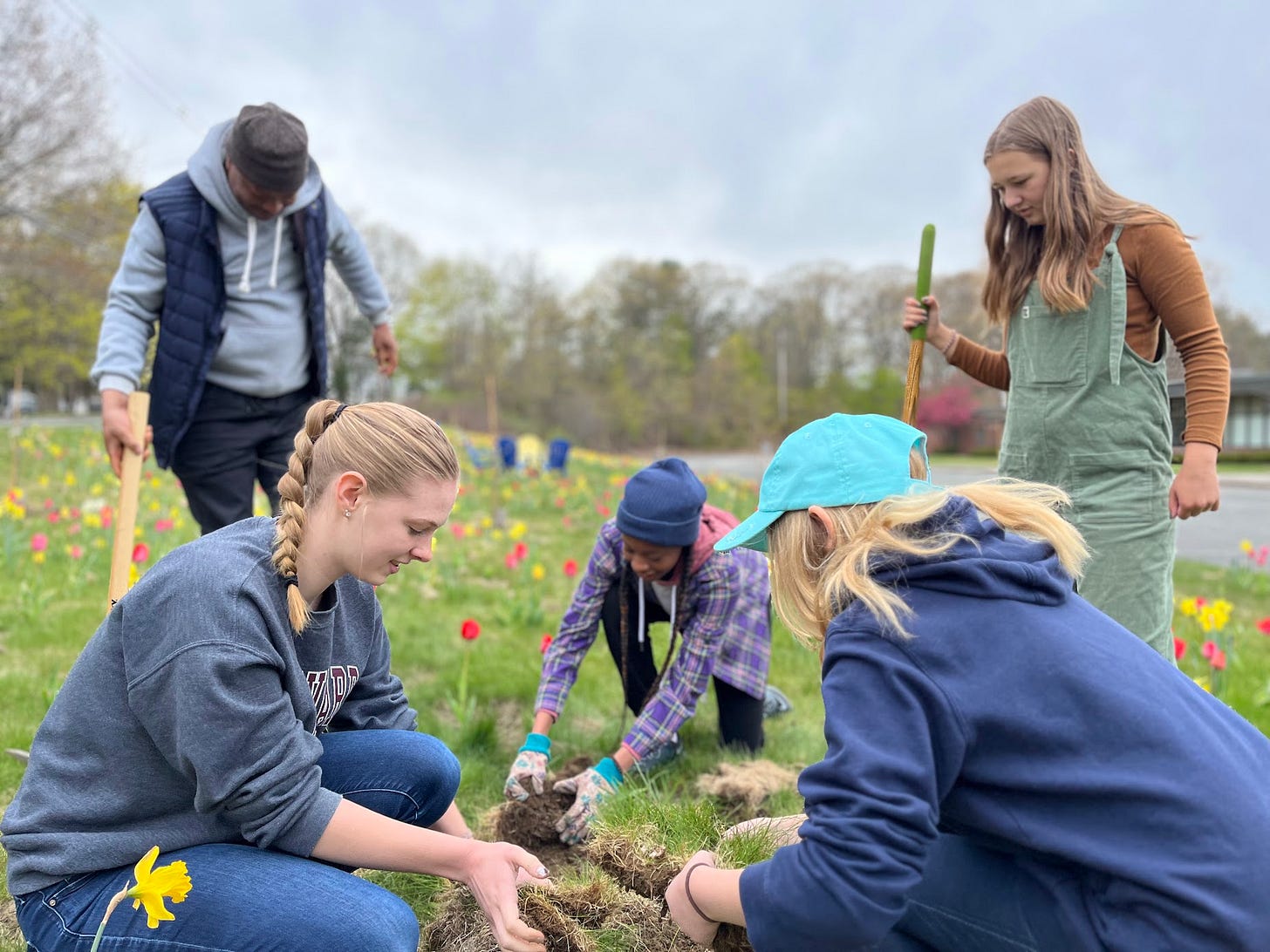This week, I’ve turned over the newsletter to Magdalen Miller, a Junior here at CCA. A member of Classical Roots since its second year, Magdalen reflects on the experience of helping to plant our orchard during a tumultuous time.
The act was trivial enough: I thrust a shovel into the ground, then gingerly placed the sapling into the space I’d made for it. If I recall correctly, my brain had just about the same reaction to those little trees that it would to a puppy or a baby: they were almost too small to exist, I thought, and adorably helpless-looking. But mostly what I thought about, as we planted them in the cold Earth, was that I couldn’t wait to come back ten years after my graduation to see these trees, taller than me now, thriving and beautiful.
By that time, there would be many other things in life I would have planted, cared for, pruned, and tended. Perhaps I would have children of my own. I would surely have friendships and aspirations and a career and a degree. There would surely be many people in my life who had watered me and pruned me and watched me grow, too. So these little trees would be a metaphor for my own growth along the way.
School is, of course, where we learn. But beyond the knowledge we require to be educated adults, what school should give us are the valuable lessons that will set us on the path of wisdom. From these trees, I’ve learned one of those valuable lessons that I will surely carry with me for the rest of my life.
About two years ago, I heard something in our daily announcements about a vegetable garden. I’m sure I didn’t even realize it existed, but there it was, in front of the upper school entrance. I was hit by a stroke of inspiration and decided to ask the leader of the club if I could join. That day at lunch, a friend and I joined a bunch of very cool upperclassmen as we scoured the woods behind our school looking for adequately straight and sturdy sticks to use for the perimeters in the vegetable garden. It is a testament to the power of nature and community that such a simple act brought me as much joy as it did. I was instantly hooked.
Three years later, I can still remember exactly how it felt. The notion that I could bypass the lunch room and instead spend my time planting vegetables, tilling soil, or stirring compost was revolutionary. I think I probably said something like: “Can we do this every day?” I never left the club.
A decided perk was forcing Mr. Miller to talk to me about books and answer countless questions about species of plants and his plans for the school. My love only grew from there. I went to a plant store and bought a strawberry plant for the home garden I planned to create. I watched in envy as the Seniors took their English class outdoors time and time again.
But the best was yet to come: we planted those beautiful little trees. In the way that a child wants something to take care of, even though we still need to be taken care of ourselves, we adolescents began to pour our hearts into these saplings. They seemed so weak and helpless. It wasn’t easy work: we broke our backs heaving buckets of water for 200 yards. To keep the trees company, we planted thousands of bulbs in hurried anticipation. It was all so urgent and beautiful. We learned to feel the seasons. We were saddened in winter, when life rests, waiting underneath the ground. If possible, Classical Roots made me love spring more than I already did. The promise of life! I know that I will come back ten years after my graduation to see that these trees have grown taller than I’ll ever be, with roots far down and sturdy. This is investment, this is promise, this is commitment. This is the legacy I want.
Classical Roots, to me, has meant opening my eyes up just a little more, raising the blinds an inch or two, to more fully take in the glory of God in our lives and in his creation, to feel and see his love acted out in the changing of the seasons, to witness the birth of new life. It has taught me so much about our roles as humans on Earth. The lesson is this: one of our chief pursuits on Earth is to steward and care for the life that surrounds us. Doing so helps us flourish and gives us a deeper understanding of God’s kingdom.
Through all of my days here, those little trees have remained, growing slowly, steadily, beautifully, and joyfully. Through the ups and downs of teenage life, through winter, through the death of a parent, and through unexplainable pain and sadness, they have patiently grown. Whenever I walk through the orchard, especially in spring, I see resurrection taking place. Even when I don’t see it, life is growing. Helping it grow has meant hard work. But it has also meant comradery, togetherness, peace, and inexplicable joy. I would not trade anything for my time with Classical Roots.
Like what you’re reading here? The best way to support the Classical Roots Program is to spread the word. Help us turn school inside out:






Magdelen, I love the image you cultivate of being watered, pruned, and tended. That what is being planted today will grow. I loved this piece :)
Very well said Ms. Miller! May you grow, sinking your "roots" deep into the soil of Our Fathers' plan for
your life, growing tall and straight like those little trees! Once you get the garden under your finger nails you can never quite get it out! God Bless!